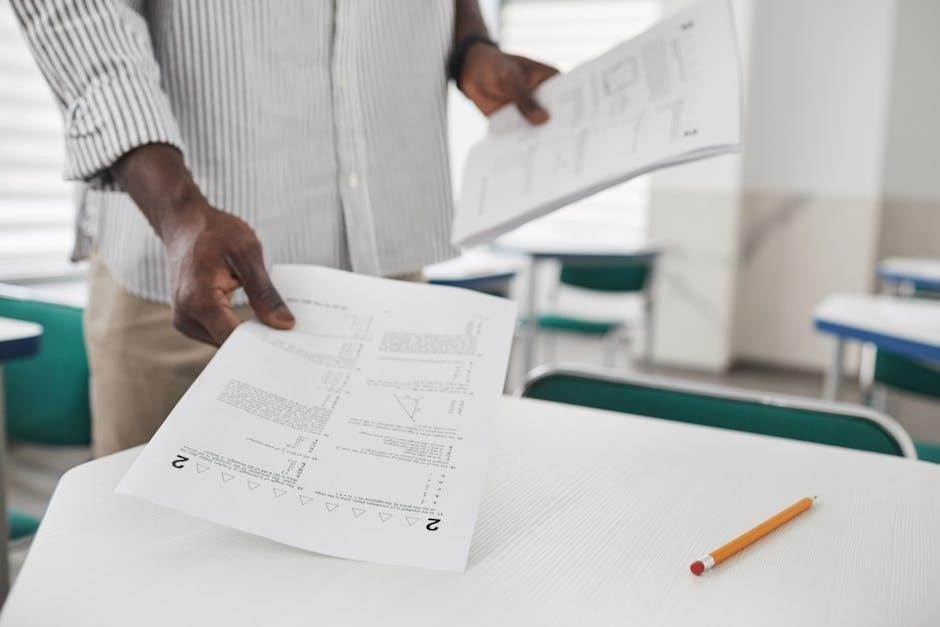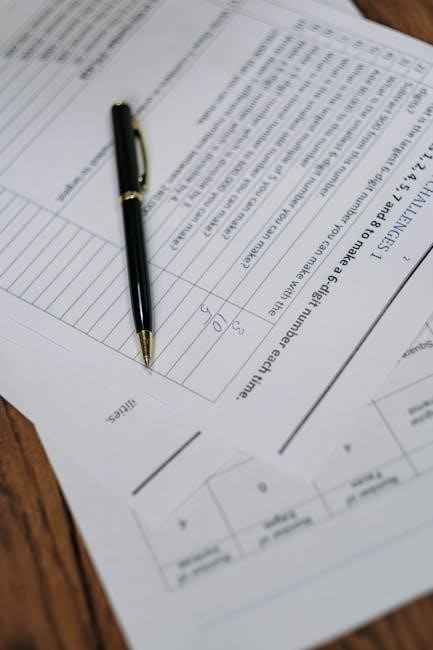gcse maths equivalency test past papers pdf

gcse maths equivalency test past papers pdf
GCSE Maths equivalency tests provide an alternative pathway for individuals without traditional GCSE qualifications. They are essential for university admissions, employment, and further education opportunities. These tests assess mathematical skills in number operations, algebra, statistics, and more, with two papers: non-calculator and calculator-based, each covering 50% of the total marks.
What Are GCSE Equivalency Tests?
GCSE equivalency tests are assessments designed for individuals who did not achieve traditional GCSE qualifications. They evaluate mathematical proficiency across number operations, algebra, geometry, statistics, and ratios. These tests are divided into two papers: a non-calculator paper focusing on foundational skills and a calculator paper for more complex calculations. Each paper is worth 50% of the total marks. They are widely recognized by universities and employers as equivalent to standard GCSE Maths. Past papers, such as the GCSE Maths equivalency test past papers PDF, are invaluable for preparation, offering insights into exam formats and question types.
Importance of GCSE Maths Equivalency Tests
GCSE Maths equivalency tests hold significant value for individuals seeking to advance their academic or professional prospects. These tests provide a recognized qualification, essential for university admissions, career development, and further education opportunities. They validate mathematical proficiency, bridging gaps for those without traditional GCSE credentials. By demonstrating numeracy and problem-solving skills, candidates enhance their employability and access to higher education courses. Utilizing past papers PDF for revision ensures familiarity with exam structures and question formats, thereby improving preparedness and confidence. Thus, these tests serve as a critical pathway for achieving personal and career goals.

Structure of the GCSE Maths Equivalency Test
The test is divided into non-calculator and calculator papers, featuring multiple-choice and open-response questions. Past papers PDFs provide insights into time allocations and question formats.
Non-Calculator Paper
The non-calculator paper assesses fundamental mathematical skills, focusing on mental arithmetic, number manipulation, and basic algebra. Typically lasting 60-90 minutes, it includes 20-30 questions. Past papers PDFs reveal question types like multiple-choice, short-answer, and problem-solving scenarios. They help students practice without calculator reliance, improving mental math and core mathematical understanding. These papers are ideal for mastering basic concepts, ensuring a strong foundation before tackling more complex topics. Regular practice with non-calculator past papers enhances accuracy and speed, essential for success in the equivalency test.
Calculator Paper
The calculator paper evaluates advanced mathematical skills, allowing the use of calculators for complex calculations. It typically lasts 90-120 minutes, featuring 30-40 questions. Past papers PDFs show a mix of multiple-choice, short-answer, and extended problem-solving questions. They help candidates familiarize themselves with calculator functions and strategies for tackling higher-tier problems. Regular practice with calculator past papers enhances computational efficiency and the ability to interpret results. These resources are crucial for refining problem-solving techniques and preparing for real exam conditions, ensuring candidates can apply mathematical concepts effectively with calculator support.
Question Types and Formats
GCSE Maths equivalency tests feature diverse question types to assess problem-solving skills. Past papers PDFs reveal a mix of multiple-choice, short-answer, and extended problem-solving questions. Multiple-choice questions test quick recall, while short-answer questions require concise calculations. Extended problems evaluate the ability to apply mathematical concepts to real-world scenarios. Some questions incorporate visual aids like graphs, tables, or diagrams, ensuring candidates can interpret and analyze data effectively. These varied formats help candidates develop a comprehensive understanding of mathematical principles and their practical applications, preparing them for the demands of the actual exam.

Key Topics Covered in GCSE Maths Equivalency Tests
GCSE Maths equivalency tests cover core topics like number operations, algebra, geometry, statistics, ratios, and proportions, ensuring a solid foundation in mathematical problem-solving skills for candidates.
Number Operations and Calculations
Number operations and calculations form the foundation of GCSE Maths equivalency tests. Candidates are assessed on their ability to perform arithmetic operations, including addition, subtraction, multiplication, and division. This section also covers fractions, decimals, and percentages, requiring precise calculation skills. Mental maths techniques and estimation methods are often tested to ensure fluency in number manipulation. Problem-solving questions may involve multi-step calculations, applying these skills to real-world scenarios. Mastery of number operations is essential for building confidence and progressing to more complex mathematical concepts in the equivalency test.
Algebra and Geometry
Algebra and geometry are core components of GCSE Maths equivalency tests. Algebra involves solving linear equations, quadratic equations, and inequalities, as well as manipulating algebraic expressions. Geometry focuses on properties of shapes, such as triangles, circles, and polygons, including calculating perimeter, area, and volume. Spatial reasoning and the application of theorems, like Pythagoras, are also assessed. These topics require logical thinking and problem-solving skills. Past papers highlight the importance of understanding algebraic manipulation and geometric principles, as they are frequently tested and form the basis for more advanced mathematical concepts.
Statistics and Probability
Statistics and Probability are essential areas in GCSE Maths equivalency tests. These topics involve interpreting and analyzing data, including measures of central tendency (mean, median, mode) and spread (range, standard deviation). Probability questions test understanding of likelihood, conditional probability, and probability rules. Past papers often include problems involving histograms, stem-and-leaf diagrams, and probability trees. Students are expected to apply statistical techniques to real-world scenarios and calculate probabilities for combined events. Practicing with past papers helps build confidence in handling data analysis and probability questions effectively, ensuring readiness for the test.
Ratio, Proportion, and Percentages
Ratio, proportion, and percentages are fundamental concepts in GCSE Maths equivalency tests. These topics involve calculating and simplifying ratios, solving proportion problems, and understanding percentage increases or decreases. Past papers often include questions on mixing ratios, converting ratios to fractions, and applying percentages to real-world scenarios. Practicing with past papers helps students master these skills, such as calculating percentage changes, finding original amounts, or determining proportions in recipes or scaling diagrams. These questions test the ability to manipulate numerical relationships accurately, ensuring students can apply these concepts confidently in various situations.

Benefits of Using Past Papers for Revision
Using past papers enhances exam preparation by familiarizing students with the test format, revealing weak areas, and improving time management skills, ensuring better performance.
Understanding Exam Formats
Using past papers helps students become familiar with the exam format, including question types, time allocation, and layout. This familiarity reduces anxiety and allows learners to focus on content rather than structure during the test. By practicing with real past papers, candidates gain insights into how questions are presented, enabling them to navigate the exam more confidently. This practical exposure ensures they understand what to expect, helping them approach the test systematically and efficiently. Familiarity with the format also aids in managing time better and prioritizing tasks during the exam.
Identifying Weak Areas
Using past papers helps learners identify their weak areas by revealing consistent mistakes and gaps in knowledge. By analyzing incorrect answers, candidates can pinpoint specific topics or skills that require improvement. Regularly reviewing these areas ensures targeted revision, enhancing overall performance. This focused approach allows learners to allocate more study time to challenging subjects, such as algebra or statistics, and track progress over time. Recognizing weak areas early enables students to address them effectively, building confidence and competence for the actual test. This targeted practice is essential for achieving success in the GCSE Maths Equivalency Test.
Improving Time Management Skills
Practicing with past papers enhances time management by simulating real exam conditions. Candidates learn to allocate time wisely across questions, ensuring they complete the test within the allotted period. Regular practice helps build speed and accuracy, reducing exam-day stress. Timing oneself during practice sessions identifies areas where more efficiency is needed. This focused approach enables learners to prioritize questions, manage their pace, and avoid spending too long on difficult problems. Effective time management is crucial for performing well in the GCSE Maths Equivalency Test, and past papers provide an ideal way to refine this essential skill.

How to Access GCSE Maths Equivalency Test Past Papers
Access GCSE Maths equivalency test past papers through official exam board websites, reputable educational resources, or PDF downloads. These sources provide authentic materials for effective revision.
Official Examination Board Websites
Official examination board websites, such as AQA, OCR, and Edexcel, provide authentic GCSE Maths equivalency test past papers in PDF format. These websites are the most reliable sources for accessing exam materials, ensuring accuracy and relevance. Students can visit the official websites, navigate to the subject section, and download past papers along with mark schemes. Many boards offer free resources, while others may require registration. These papers are well-organized by year and exam series, making it easy to locate specific tests. Using official sources guarantees up-to-date and authentic materials, essential for effective revision and preparation.
Reputable Educational Resources
Reputable educational resources like BBC Bitesize, MyMaths, and other trusted platforms offer GCSE Maths equivalency test past papers in PDF format. These websites often provide comprehensive collections of past papers, along with mark schemes and study guides. They are designed to support students in their revision journey, ensuring access to high-quality materials. Many of these resources are free or require minimal subscription fees, making them accessible to a wide audience. Additionally, these platforms frequently update their content, ensuring students have the latest materials to prepare effectively for their exams.
PDF Downloads and Printing Options
Many websites offer GCSE Maths equivalency test past papers in PDF format, allowing easy downloading and printing. Platforms like Past Papers Co or Exam-Mate provide downloadable PDFs, enabling students to access materials offline. Printing options are straightforward, with most PDFs formatted for A4 paper. Students can organize printed papers into binders or folders for structured revision. This flexibility ensures that learners can study anywhere, even without internet access. Additionally, PDFs often include answer sheets, making self-assessment convenient. Printing past papers is a cost-effective way to simulate exam conditions and enhance preparation.

Effective Revision Strategies Using Past Papers
Using past papers for revision helps students simulate exam conditions, identify strengths, and improve time management. Regular practice builds confidence and familiarity with question formats.
Setting Up a Study Schedule
Creating a structured study schedule is essential for effective revision. Allocate specific time slots for each topic, ensuring a balanced approach. Dedicate days to focus on past papers, starting with non-calculator questions to build foundational skills. Set aside time for reviewing answers and understanding mistakes. Incorporate short breaks to maintain focus and prevent burnout. Prioritize weaker areas identified through practice tests. Use a planner or digital calendar to track progress and stay organized. Regularly review and adjust the schedule to ensure all topics are covered comprehensively before the test date. Consistency is key to achieving exam success.
Practicing Under Exam Conditions
Simulating real test conditions helps build exam readiness. Use past papers to practice within the allocated time, mirroring the actual exam duration. Work in a quiet, distraction-free environment to replicate test-day conditions. Avoid using calculators for non-calculator sections and stick to the prescribed format. This practice enhances time management and reduces anxiety. Review your attempts to identify patterns in errors and improve accuracy. Regularly practicing under exam conditions boosts familiarity with the test format and increases confidence in handling the pressure effectively. Consistent practice helps refine strategies for tackling challenging questions efficiently.
Reviewing Answers and Feedback
Reviewing answers and feedback is crucial for understanding strengths and weaknesses. After completing past papers, compare your responses with official mark schemes or answer keys. Analyze incorrect answers to identify common mistakes and areas needing improvement. Use feedback to refine problem-solving techniques and time management. Regular review helps track progress, build confidence, and develop a deeper understanding of exam expectations. By learning from errors, candidates can enhance their performance in subsequent practice tests and ultimately achieve better results in the actual GCSE Maths Equivalency Test.

Additional Resources for GCSE Maths Equivalency
- Revision guides and workbooks for in-depth study.
- Online practice tests for digital exam prep.
- Study groups and tutoring for collaborative learning.
Revision Guides and Workbooks
Revision guides and workbooks are essential resources for GCSE Maths equivalency preparation. They provide detailed explanations, practice questions, and exercises tailored to exam content. These materials help reinforce key concepts and improve problem-solving skills. Many guides are structured by topic, allowing focused study on areas like number operations, algebra, and statistics. Workbook exercises often include step-by-step solutions, enabling students to track their progress and identify weaknesses. Additionally, mixed-topic sections simulate real exam conditions, helping learners develop time management and application skills. These resources are widely available in print or digital formats, offering flexibility for diverse learning styles and preferences.
Online Practice Tests
Online practice tests are a valuable tool for preparing for GCSE Maths equivalency exams. They simulate real test conditions, helping candidates familiarize themselves with the format and timing. Many platforms offer instant scoring and detailed feedback, allowing learners to assess their performance and identify areas for improvement. These tests often include a wide range of questions, covering topics like number operations, algebra, and statistics. Regular use of online practice tests can enhance problem-solving skills, boost confidence, and ensure readiness for the actual exam. They are accessible anytime, making them a flexible and convenient revision option.
Study Groups and Tutoring Options
Study groups and tutoring options provide collaborative and personalized support for GCSE Maths equivalency test preparation. Joining a study group allows learners to discuss challenging topics, share resources, and gain new insights from peers. Tutoring, whether one-on-one or in small groups, offers tailored guidance, helping students address specific weaknesses. Tutors can breakdown complex concepts, provide additional practice materials, and reinforce understanding of key topics. These options foster a supportive learning environment, boosting confidence and readiness for the exam. They are particularly beneficial for those who prefer interactive or guided learning approaches.

Common Challenges in GCSE Maths Equivalency Tests
- Time pressure and complex question formats.
- Gaps in foundational maths knowledge.
- Struggles with higher-tier problem-solving questions.
- Difficulty in applying concepts to real-world scenarios.
Time Pressure and Question Complexity
One of the most common challenges in GCSE Maths equivalency tests is managing time effectively. With a large number of questions to answer, candidates often feel rushed, leading to errors. Additionally, the complexity of certain questions, particularly higher-tier problems, can be daunting. These questions require multiple steps and deep understanding, increasing stress levels. To overcome this, practicing with past papers helps build familiarity with question formats and improves time management skills. Candidates can identify patterns in question types and allocate time wisely, ensuring they tackle both straightforward and complex problems efficiently. Regular practice is key to building confidence and speed.
Understanding Examiner Expectations
Understanding what examiners expect is crucial for success in GCSE Maths equivalency tests. Past papers reveal the structure and tone of questions, helping candidates anticipate content. Examiner reports highlight common mistakes, such as calculation errors or misinterpretation of questions. By analyzing these, learners can focus on areas where marks are frequently lost. Additionally, past papers demonstrate the importance of clear presentation and step-by-step reasoning. This insight helps candidates align their answers with marking schemes, ensuring they meet the required standards. Familiarity with examiner expectations builds confidence and reduces uncertainty during the test.
Managing Anxiety During the Test
Managing anxiety during the GCSE Maths equivalency test is essential for optimal performance. Deep breathing exercises can help calm nerves, while positive visualization techniques can boost confidence. Practising with past papers under timed conditions builds familiarity, reducing exam-day jitters. Breaking questions into smaller steps prevents overwhelm. Staying hydrated and ensuring physical comfort also supports focus. Remember, it’s okay to skip and return to challenging questions later. Prioritising accuracy over speed and maintaining a steady pace helps manage stress effectively. A calm and focused mindset is key to showcasing your true abilities during the test.

Final Tips for Success
Stay motivated, practice consistently, and remain confident. Seek support when needed and maintain a positive mindset. Proper preparation and past paper practice are key to success.
Staying Motivated

Staying motivated is crucial for success in GCSE Maths Equivalency Tests. Set clear, achievable goals and celebrate small milestones. Use past papers to track your progress and identify improvements. Create a study routine and stick to it, even when challenges arise. Remind yourself why achieving this qualification is important. Surround yourself with supportive people and maintain a positive mindset. Break study sessions into manageable chunks to avoid burnout. Reward yourself for consistent effort, and believe in your ability to succeed. Motivation will fuel your journey to exam success.
Seeking Support When Needed
Seeking support is vital when preparing for GCSE Maths Equivalency Tests. Don’t hesitate to ask teachers, tutors, or peers for help with challenging topics. Online forums and study groups can provide valuable insights and tips. Utilize educational websites offering video tutorials or interactive exercises. If struggling with concepts, consider hiring a private tutor for personalized guidance. Additionally, revision guides and workbooks can offer step-by-step explanations. Remember, seeking support is a strength, not a weakness, and it can significantly enhance your understanding and confidence in tackling the test.
Remaining Confident on Test Day
Remaining confident on test day is crucial for optimal performance. Ensure you are well-prepared by thoroughly revising and practicing with past papers. Familiarize yourself with the exam format and timing to reduce anxiety. Arrive early at the test center to avoid last-minute stress. Take deep breaths and stay calm; remind yourself of your hard work and readiness. Approach each question systematically, and don’t dwell on challenging problems. Confidence boosts your ability to think clearly and make sound decisions under pressure. Trust in your preparation and maintain a positive mindset throughout the test.